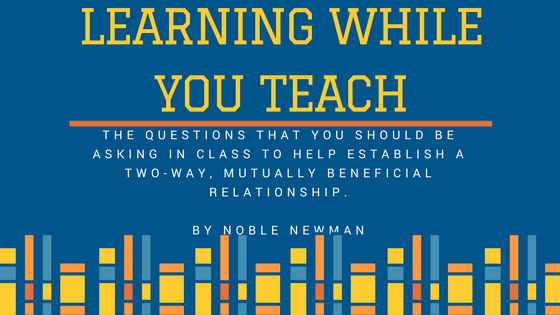
Think back to your years as a student, stuck in a classroom for eight or nine hours a day listening to your teachers drone on and on about their class curriculum. They talked, you took notes, maybe nodded, and answered a question or two. You were so focused in on taking articulate notes, jotting down what was being reviewed as quickly and efficiently as possible to ensure that, come test time, you’d pass.
You probably remember class–whether it was high school, middle school or elementary school in almost this exact way. You remember the things your teacher said, what he or she taught you about, and his or her mannerisms. You might not remember the questions that your teachers have asked over the years. This is because our notion of teaching is a one-way communication model–the teacher teaches, the students listen.
This is one of the most incorrect and often poorly approached aspects of teaching. Teaching should not be a one-way path. As a teacher, it’s your job to not only teach your students, but to learn from them, inviting conversation and two-way communication.
This is done primarily by asking questions; more specifically, by asking the right questions. The questions below are suggestions to get you started–some are more for higher grades, other for younger students. Some are for in-class use, others in personal one-on-one scenarios. Tailor them to best fit your situation. The most important thing is that you’re asking the right questions.
Ask Them Their Aspirations
Every student is going to have dramatically different career goals. If you’re a teacher of younger students you might get multitudes of “fireman, doctor, police officer, professional athlete,” responses. And while relatively few of your students will wind up playing in the NBA, an answer like these even in early years does give you more information about the student and allows you to connect to them on a personal level.
When students get older, their aspirations may be “to go to college,” “to be an entrepreneur,” or “to work in advertising.” These goals are more solidified and can be building blocks for forming a relationship with your students.
Ask Their Opinions
Perhaps this one is best left for older students, as third or fourth graders might not have a firm view on capital gains tax. But asking for students’ opinions on matters is a perfect segue into what they can expect should they choose to go on to higher education. Your classroom shouldn’t just be a setting for your students to grow and learn, they should feel comfortable expressing themselves. And with heightened levels of expression, you’ll have the opportunity to learn more about your students.
Ask Their Preferences, and Invite Criticism
No one likes being criticized, of course. But when you mark up a student’s paper, you’re doing it in a constructive way with an end goal of fostering a better understanding of the subject on his or her part. So why not do the same for your students? By working with your students, you can ensure that both parties grow personally and professionally. By listening to the concerns that they have, you’ll be a better teacher, and walk away from the ordeal better prepared for the future.
